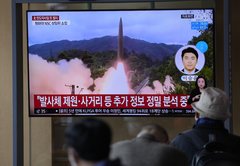Join allies to negotiate with North Korea on denuclearization
Joe Biden
"In North Korea, President Biden will empower our negotiators and jump start a sustained, coordinated campaign with our allies and others, including China, to advance our shared objective of a denuclearized North Korea."
Biden Promise Tracker

Compromise

